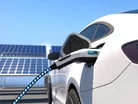Electric vehicles are only as clean as their suppliers

Opinion piece by Sammie Eastwood, Guest Editor.
It’s a fact. Switching to electric vehicles (EV), in the long term, is better for the environment. On average a typical passenger car, powered by an internal combustion engine (ICE), releases 4.6 metric tons of CO2 into the atmosphere per year. Switching to EVs effectively reduces these exhaust emissions to zero.
However, exhaust emissions are only the tip of the proverbial iceberg. Due to challenges with developing and storing green energy, electricity production is still predominantly powered by fossil fuels. Add to this the materials required to produce EVs, such as plastics, metals and minerals, coming from crude oil or mining, and they still pose a negative impact on the environment.
Green energy of top concern
The most major concern is the generation of the electricity used to power EVs, which will experience increased demand once there is widespread use of this new technology. Many energy providers are working on smart technologies to try to increase energy efficiency. However, fossil fuels are still used to produce 64% of the world’s electricity, with Green & Renewable representing just 25%.
Green energy is volatile and must be stored to be used later using batteries, which unfortunately poses a few problems. Firstly, materials to make batteries, such as lithium and cobalt, are hard to get hold of and mining has significant impacts on the environment and local communities.
Another problem is that fully charged batteries will incrementally drain if the power isn’t used straight away, meaning long term energy storage will have diminishing returns. Currently fossil fuels are the best solution to maintaining consistent power levels across the grid.
There is potential to take EV charging off-grid using things like Solar trees, or other biomimicking devices, that can provide self-sustaining solar-powered charging. However, these are still under development, and may not work well in locations, such as the northern hemisphere, that lack adequate sunlight throughout the year.
EVs demand clean materials
The next issue is that EVs are manufactured goods that require components such as plastics, metals, rare earth magnets, and other raw materials that do damage simply by removing them from the earth. Ramping up EV production without addressing the ecological impact of their supply chain seems counterproductive.
Not only this but EVs are not without their own particulate pollutants, such as ceramic dust generated by their braking system. However, it appears an interesting solution to this problem could be held within EV’s regenerative braking capabilities. As Hannah Brown, Chief of Staff for Formula E, mentioned while speaking on their Gen 3 vehicle that will be hitting the race course in 2023, “this car is going to regenerate so much power, we’re going to take off a set of brakes from the car [...] [pollution] is not just about the fuel we burn but [...] particulate pollution is also a big factor”.
However, the impact of sourcing materials for EV manufacturing needs to be a big consideration as operations in this sector begin to scale. A hundred years ago we didn’t think about the impact burning fossil fuels could have on our environment, we just thought ‘look how fast I can make this motor run!’ In similar fashion, we don’t want to fix one problem while simultaneously creating another for our grandchildren to solve.
Reduction in fossil fuels
It doesn’t look like the fossil fuel industry is going away anytime soon, with the UK & EU even backing new fossil fuel extraction facilities and investing in fossil fuel infrastructure. Just switching to EV is not going to fix the climate problem, and we need to stop pretending it will.
A full-scale global effort to reduce dependence on fossil fuels, improve efficiency, and develop supply chain practices that don’t steal from the environment is the only way forward. We can’t keep prioritising profit over the health of our planet, because once the climate is destroyed there’s no turning back.

